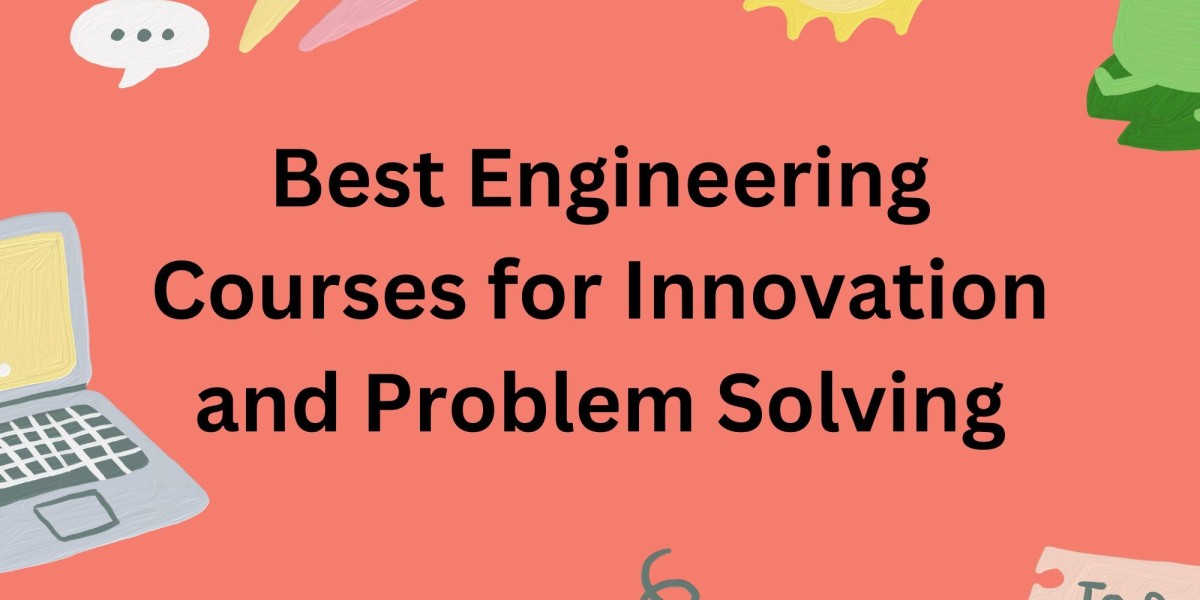Engineering is a discipline that shapes the world by driving technological advancements and providing solutions to some of the most complex challenges faced by society. From revolutionizing healthcare to creating sustainable solutions, engineering plays a pivotal role in shaping a better future. The best engineering courses for innovation and problem-solving are designed to equip students with the knowledge, skills, and creativity required to address real-world challenges. These courses focus on developing critical thinking, analytical skills, and the ability to apply engineering principles in innovative ways.
In this article, we will explore some of the top engineering courses that foster innovation and problem-solving, offering a pathway to success for those who want to make a meaningful impact on the world.
1. Computer Science and Engineering
In the digital age, computer science and engineering (CSE) has emerged as one of the most influential and innovative fields. With technology permeating every aspect of human life, CSE professionals are at the forefront of shaping the future. Courses in computer science and engineering cover a wide range of topics, from programming languages and software development to artificial intelligence (AI), machine learning, data analysis, and cybersecurity.
Why it fosters innovation and problem-solving:
CSE students learn how to design and develop software solutions to address complex issues in industries ranging from healthcare to finance. They are trained to think critically and develop algorithms and systems that can solve real-world problems, whether it's improving communication, enhancing security, or creating new technologies that drive progress.
Key courses in CSE:
- Data Structures and Algorithms
- Artificial Intelligence
- Machine Learning
- Cybersecurity
- Software Engineering
2. Electrical and Electronics Engineering
Electrical and electronics engineering (EEE) is another field that fosters innovation and problem-solving. This branch of engineering focuses on the development of electrical systems, devices, and components that power the modern world. Electrical engineers play a crucial role in making everyday life more efficient and sustainable, from smartphones to renewable energy systems.
Why it fosters innovation and problem-solving:
EEE students are trained to design, test, and improve electrical systems and electronic devices, finding innovative solutions to problems like energy efficiency, power distribution, and communication. Focusing on renewable energy sources and smart grid technologies has made EEE one of the most dynamic and forward-thinking engineering disciplines.
Key courses in EEE:
- Circuit Theory and Analysis
- Power Electronics
- Renewable Energy Systems
- Microelectronics
- Communication Systems
3. Mechanical Engineering
Mechanical engineering is one of the oldest and most versatile branches of engineering. It focuses on designing, analyzing, and manufacturing mechanical systems, such as engines, machines, and thermal systems. The field combines principles of physics, mathematics, and materials science to create solutions that power industries and improve quality of life.
Why it fosters innovation and problem-solving:
Mechanical engineers are trained to develop innovative solutions for a wide range of problems, from improving the efficiency of internal combustion engines to designing robotic systems that aid in manufacturing. The field is at the heart of innovation in automotive, aerospace, and manufacturing industries, constantly evolving to meet new technological demands.
Key courses in Mechanical Engineering:
- Thermodynamics
- Fluid Mechanics
- Manufacturing Processes
- Robotics
- Mechanical Design
4. Civil Engineering
Civil engineering is all about designing and constructing infrastructure that serves society’s needs, including buildings, bridges, roads, and water supply systems. With the growing urban population and the increasing need for sustainable infrastructure, civil engineering is a field that demands creative and problem-solving skills.
Why it fosters innovation and problem-solving:
Civil engineers are responsible for developing structures and systems that must withstand environmental challenges and serve communities effectively. They use advanced modeling techniques, materials science, and environmental engineering principles to design sustainable solutions. Innovation is crucial, particularly in areas like green building technology, sustainable urban planning, and disaster-resistant infrastructure.
Key courses in Civil Engineering:
- Structural Analysis and Design
- Environmental Engineering
- Construction Management
- Transportation Engineering
- Geotechnical Engineering
5. Aerospace Engineering
Aerospace engineering is a specialized branch that focuses on designing and developing aircraft and spacecraft. With advancements in space exploration and air travel, aerospace engineering is at the forefront of solving some of the world’s most fascinating and complex challenges.
Why it fosters innovation and problem-solving:
Aerospace engineers are responsible for designing and optimizing systems that work in extreme conditions. From enhancing the efficiency of jet engines to developing spacecraft for deep space exploration, aerospace engineers use cutting-edge technology and innovative designs to push the boundaries of what is possible.
Key courses in Aerospace Engineering:
- Aerodynamics
- Propulsion Systems
- Flight Dynamics
- Spacecraft Design
- Avionics and Control Systems
6. Environmental Engineering
Environmental engineering is an interdisciplinary field that focuses on developing solutions to environmental problems, such as water pollution, waste management, and climate change. It combines principles from civil, chemical, and mechanical engineering to create sustainable solutions that protect the environment.
Why it fosters innovation and problem-solving:
Environmental engineers work on the frontlines of climate change, resource conservation, and environmental protection. They are tasked with finding innovative solutions for managing natural resources, reducing waste, and developing clean technologies. As environmental challenges become more pressing, the demand for creative solutions continues to rise.
Key courses in Environmental Engineering:
- Water Resources Engineering
- Wastewater Treatment
- Environmental Impact Assessment
- Air Pollution Control
- Renewable Energy Technologies
7. Biomedical Engineering
Biomedical engineering is an interdisciplinary field that combines engineering principles with medical and biological sciences. This rapidly growing field focuses on developing technologies that improve healthcare, such as medical devices, prosthetics, and diagnostic tools.
Why it fosters innovation and problem-solving:
Biomedical engineers design devices and systems that solve complex healthcare challenges, such as developing artificial organs, improving medical imaging technologies, or creating innovative drug delivery systems. This field requires a deep understanding of both engineering and biological systems, fostering creativity and problem solving in the healthcare sector.
Key courses in Biomedical Engineering:
- Biomechanics
- Medical Imaging
- Biomaterials
- Bioinformatics
- Rehabilitation Engineering
Conclusion
The best engineering courses for innovation and problem-solving are those that push the boundaries of what is possible, challenging students to think creatively and critically. Whether it’s through developing cutting-edge software, designing sustainable infrastructure, or improving healthcare systems, engineers are at the heart of solving global challenges. By pursuing a degree in one of these dynamic engineering disciplines, students can contribute to shaping the future and driving positive change in the world.



